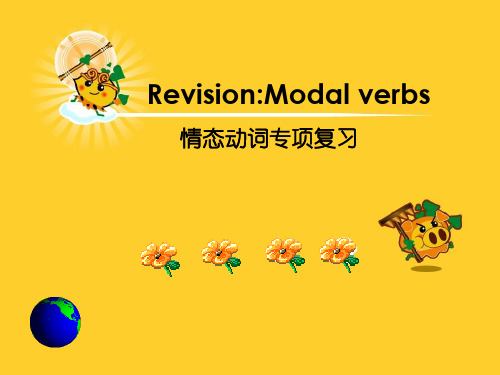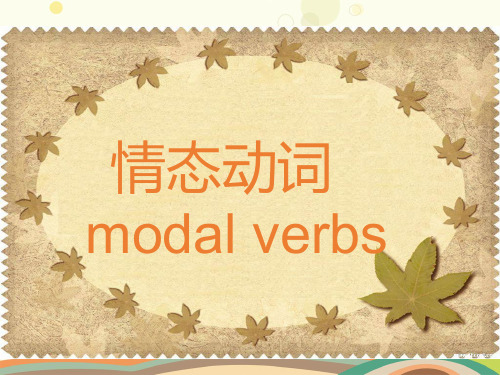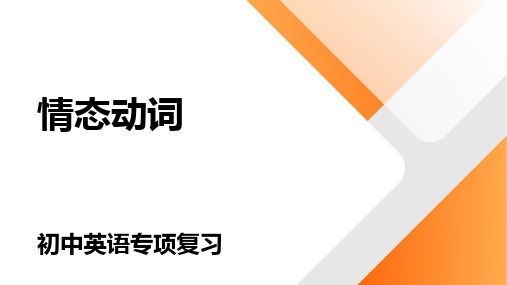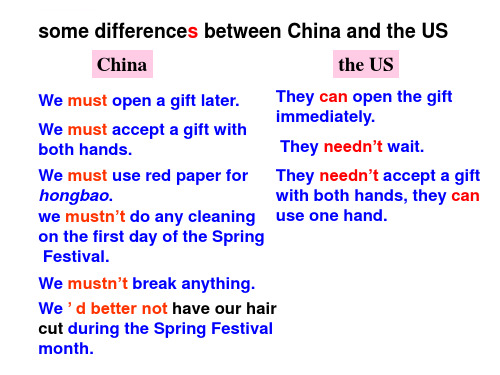情态动词PPT课件
合集下载
情态动词(20张PPT)初中英语专项复习课件

看法。
(1)只作情态动词:must;can/could;may/might;ought to
(2)既可作情态动词又可作实义动词:need,dare
((34))既 具可 有作 情情 态态 动动词词某又些可特作征稿稿定助:定hPa动PPvTP,e词T/海h:量asd素ha材tlo持l;/s续hha更odublde;twteirll/would
【知识拓展】
1. must的一般疑问句,肯定回答为Yes, ...must.;否定回答为No, ...needn’t./No, ...don’t have
to.—Must I clean the classroom now? 我必须现在打扫教室吗?
—Yes, you must. 是的,你必须。/No, you don’t have to. /No, you needn’t. 不,你不必。
He promised he would never smoke again. 他承诺他再也不吸烟了。
Their English teacher would tell them stories in
表示过去反复发生的动 English after class.
作或某种倾向
他们的英语老师总是在课后用英语给他们讲故事
新,上千款模板选择总有一
款适合你
知识点二:情态动词的特点
情态动词的特点: (1)情态动词无人称和数的变化(have to除外); (2)情态动词后接动词原形; (3)情态动词的否定式是在其后加not; have to除外 (4)具有助动词的作用,可用来构成否定句、疑问句及用于简明答语; (5)个别情态动词有现在式和稿过定去PP式T两种形式,过去式用来表达更加客气、委 婉的语气,时态性不强,可稿用定于PPT过,海去量、素材现持在续更或将来。
(1)只作情态动词:must;can/could;may/might;ought to
(2)既可作情态动词又可作实义动词:need,dare
((34))既 具可 有作 情情 态态 动动词词某又些可特作征稿稿定助:定hPa动PPvTP,e词T/海h:量asd素ha材tlo持l;/s续hha更odublde;twteirll/would
【知识拓展】
1. must的一般疑问句,肯定回答为Yes, ...must.;否定回答为No, ...needn’t./No, ...don’t have
to.—Must I clean the classroom now? 我必须现在打扫教室吗?
—Yes, you must. 是的,你必须。/No, you don’t have to. /No, you needn’t. 不,你不必。
He promised he would never smoke again. 他承诺他再也不吸烟了。
Their English teacher would tell them stories in
表示过去反复发生的动 English after class.
作或某种倾向
他们的英语老师总是在课后用英语给他们讲故事
新,上千款模板选择总有一
款适合你
知识点二:情态动词的特点
情态动词的特点: (1)情态动词无人称和数的变化(have to除外); (2)情态动词后接动词原形; (3)情态动词的否定式是在其后加not; have to除外 (4)具有助动词的作用,可用来构成否定句、疑问句及用于简明答语; (5)个别情态动词有现在式和稿过定去PP式T两种形式,过去式用来表达更加客气、委 婉的语气,时态性不强,可稿用定于PPT过,海去量、素材现持在续更或将来。
中考英语复习情态动词课件(共27张PPT).

ought to侧重于表示按照法律,法规等规 定,就强制意义的责任或义务。
should含有个人意见,强调主观看法,语 气比ought to稍弱。
had better
1. It’s raining outside, you’d better stay at home. 2. It’s very cold, you had better not go out.
may表示请求时,肯定回答用may, can;否定回答用mustn’t 或can’t。
二、表示义务类
1. Students must finish their homework before class. 2. I have to go now. 3. Children should learn to respect others. 4. I need type this letter before work. 5. I need to type this letter before work.
must:必须 have to: 不得不 should:应该 need:需要
need 需要(情态动词、实意动词) have to 不得不
三、表示能力类
1. I can draw. = I am able to draw. 2. I could ride a bike when I was six years old.
能,可能,应该, 必须,不得不,需要
最好,将要,可以
must表示肯定是,用于肯定句 can 表示可能,用于否定句,疑问句 may表示可能,用于肯定句
“肯定 是”
“不可 能是”
“可能 是”
对一般现 对现在进 对一般过 对过去进 在推测 行推测 去推测 行推测
情态动词讲解精ppt课件

例句
will/would
详细描述:will 表示现在的意愿或 预测,would 表示过去的或虚拟 的意愿或预测。
1. I will help you with your project.(我会帮助你完成你的项 目。)
总结词:表示意愿或预测
例句
2. They would have gone to the party if they had known about it earlier.(如果他们早点 知道,他们就会去参加聚会。)
表示意愿
情态动词+动词原形,如 would like to go,表示 某人想要去。
形式变化
基本形式
情态动词的基本形式包括 现在时、过去时和将来时 。
过去式
情态动词的过去式通常是 在基本形式后面加-d或ed,如could have done 、should have done等。
将来时
情态动词的将来时通常是 在基本形式后面加-will或shall,如will be able to 、shall have to等。
may与might的区别与联系
总结词
may表示现在的许可或可能性;might表示过去的可能性或许可。
详细描述
may用于肯定句中,表示许可或可能性,例如“You may use this room.”(你可以使用这个房间。 )“The book may be in the library.”(这本书可能在图书馆里。)might表示过去的可能性,常 用于过去时态的句子中,例如“He might come tomorrow.”(他明天可能来。)
未必、很难说
She might not agree with us.
表示虚拟语气
will/would
详细描述:will 表示现在的意愿或 预测,would 表示过去的或虚拟 的意愿或预测。
1. I will help you with your project.(我会帮助你完成你的项 目。)
总结词:表示意愿或预测
例句
2. They would have gone to the party if they had known about it earlier.(如果他们早点 知道,他们就会去参加聚会。)
表示意愿
情态动词+动词原形,如 would like to go,表示 某人想要去。
形式变化
基本形式
情态动词的基本形式包括 现在时、过去时和将来时 。
过去式
情态动词的过去式通常是 在基本形式后面加-d或ed,如could have done 、should have done等。
将来时
情态动词的将来时通常是 在基本形式后面加-will或shall,如will be able to 、shall have to等。
may与might的区别与联系
总结词
may表示现在的许可或可能性;might表示过去的可能性或许可。
详细描述
may用于肯定句中,表示许可或可能性,例如“You may use this room.”(你可以使用这个房间。 )“The book may be in the library.”(这本书可能在图书馆里。)might表示过去的可能性,常 用于过去时态的句子中,例如“He might come tomorrow.”(他明天可能来。)
未必、很难说
She might not agree with us.
表示虚拟语气
《情态动词表推测》课件

根据所给语境,选择合适的情态动词表达对过去事实的 推测。
通过实际语境中的情态动词使用,培养语言逻辑思维能 力。
练习题三:对将来事实的推测
掌握对将来事实的推测 理解情态动词在时间表达中的运用
提高语言表达能力
练习题三:对将来事实的推测
01
练习内容:
02
根据所给语境,选择合适的情态动词表达 对将来事实的推测。
《情态动词表推测》ppt课件
目录
• 情态动词表推测的定义 • 情态动词表推测的用法 • 情态动词表推测的注意事项 • 情态动词表推测的练习与解析 • 总结与回顾
01
情态动词表推测的定义
什么是情态动词
01
情态动词是表示说话人的语气和 态度的动词,它们通常与助动词 结合使用,表达可能性、必要性 、意愿等意义。
02
情态动词表推测的用法
对现在事实的推测
总结词
表示对目前情况的推测
详细描述
情态动词如“may”,“might”,“could”等可以用来表示对目前情况的推 测,通常基于某些证据或迹象,但不确定。例如:“It may be raining today ,based on the dark clouds in the sky.”
以上内容仅供参考,具体内容可以根据实际需求进行修改和 调整。
04
情态动词表推测的练习与解析
练习题一:对现在事实的推测
掌握对现在事实的推 测
提高语言实际运用能 力
理解不同情态动词的 细微差别
练习题一:对现在事实的推测
01
练习内容:
02
03
04
根据所给语境,选择合适的情 态动词表达对现在事实的推测
02
常见的情态动词有can、may、 must、should等。
《情态动词》PPT课件

work our this problem. 如果你睡个好觉,那么你就能做出这个题目。 3、表示过去的能力: could表示过去一般的能力, 但不表示做或未做某事;
was/ were able to表示过去有能力并且成功地做了某事, 相当于managed to do something/ succeeded in doing something;
• Mr. Bush is on time for everything. How can it be that he was late for the opening ceremony? (表疑惑、惊讶)
表示请求、允许、允诺
1. 当对方是决策者时,你代表你(们)自己(I, We),或代表第三者(he,she,they)向对方 (you)请示或提出建议时用:
Revision:Modal verbs
情态动词专项复习
How many modal verbs
do you remember?
(情态动词)
一,常见的情态动词有:can, could, may, might ,must, shall, should, will, would, need, have to等
4、具有情态动词的某些特征的有:have(had) to, used to.
情态动词的特征
1、有一定的词义,但不能单独作谓语,它们要和行 为动词或连系动词连用,构成谓语。
2、适用于主语的各种人称和数 have to例外,主语 是第三人称单数时,要用has to)。如:
We/ He must work hard. 我们/他一定要努力工作。 I have to walk home. 我得步行回家。 He has to walk home. 他得步行回家。
was/ were able to表示过去有能力并且成功地做了某事, 相当于managed to do something/ succeeded in doing something;
• Mr. Bush is on time for everything. How can it be that he was late for the opening ceremony? (表疑惑、惊讶)
表示请求、允许、允诺
1. 当对方是决策者时,你代表你(们)自己(I, We),或代表第三者(he,she,they)向对方 (you)请示或提出建议时用:
Revision:Modal verbs
情态动词专项复习
How many modal verbs
do you remember?
(情态动词)
一,常见的情态动词有:can, could, may, might ,must, shall, should, will, would, need, have to等
4、具有情态动词的某些特征的有:have(had) to, used to.
情态动词的特征
1、有一定的词义,但不能单独作谓语,它们要和行 为动词或连系动词连用,构成谓语。
2、适用于主语的各种人称和数 have to例外,主语 是第三人称单数时,要用has to)。如:
We/ He must work hard. 我们/他一定要努力工作。 I have to walk home. 我得步行回家。 He has to walk home. 他得步行回家。
情态动词(17张PPT)初中英语专项复习课件

情态动词表推测也是每年中考的重点,以考查can’t 和must为主,主要在单项选择中考查不同情态动词的辨 析。考生在解答此类试题时,可以从以下几方面着手: ①表示否定的推测:一是断然的否定,此类题一般是考 查情态动词表推测的用法,语境会对所填空给出解释, 据 此 可 以 判 断 是 非 常 肯 定 的 否 定 , 此 时 最 好 用 cannot /can’t;二是表示不能十分肯定或拿不准,此类题一般 也会有相关的语境提示,如I’m not sure、who knows等 ,此时最好用may或might。
表示需要、必须,主 要用于否定句和疑问 句中。needn’t常用 于回答must表请求的 否定回答
—Must I finish my homework now?我必 须现在完成我的家庭作 业吗? —No, you needn’t. 不, 你不需要。
注意 (1) must和have/has to均意为“必须”,常可互 换使用。但have/has to是用于强调客观需要,意为 “必须, 不得不”;must用于表示主观看法, 意为“ 必须, 应该”。如:We’ll have to ask Zhang Hong. 我们必须去问张红了。 We must work hard at school. 在学校我们必须 努力学习。
情态动词本身有一定的意义,但不能独立作谓语, 没有人称和数的变化,后面必须接动词原形。常见的情 态动词有:may, must, need, have to 等,具体用法见下表 :
情态动词
用法
例句
表示能力,意为 Sam can speak English well.
can “能,会”
山姆英语讲得很好。
He could have gone home. 他可能已回家了。
表示需要、必须,主 要用于否定句和疑问 句中。needn’t常用 于回答must表请求的 否定回答
—Must I finish my homework now?我必 须现在完成我的家庭作 业吗? —No, you needn’t. 不, 你不需要。
注意 (1) must和have/has to均意为“必须”,常可互 换使用。但have/has to是用于强调客观需要,意为 “必须, 不得不”;must用于表示主观看法, 意为“ 必须, 应该”。如:We’ll have to ask Zhang Hong. 我们必须去问张红了。 We must work hard at school. 在学校我们必须 努力学习。
情态动词本身有一定的意义,但不能独立作谓语, 没有人称和数的变化,后面必须接动词原形。常见的情 态动词有:may, must, need, have to 等,具体用法见下表 :
情态动词
用法
例句
表示能力,意为 Sam can speak English well.
can “能,会”
山姆英语讲得很好。
He could have gone home. 他可能已回家了。
情态动词ppt课件市公开课获奖课件省名师示范课获奖课件

I don’t like this TV set. We must buy a new one. There was no more bus. They had to walk home.
• (2) must旳否定形式mustn’t表达禁止, 意思是“不能,不许”。例如:
• (2023上海春)When I was young, I was told that I ______ play with matches
B. it is used to
• C. it was used to
D. it used to be
• 【答案】A D
(三)情态动词+have done
• must表达对某人某事旳猜测;对过去发生旳 事情作肯定判断用must have done
There is nobody here. They must have all gone home.
• can用于肯定句中表达一种理论上旳可能性, 并不牵涉是否真旳会发生;
• The road can be blocked. • could用于肯定句中,语气比can更弱。
• (4)may (not) / might (not)体现一种不太把 握旳推测,意为“或许,可能”;might旳 语气比may较婉转.
• A. might B. should C. could D. would
• 【答案】D
• (2) would表达过去倾向性或习惯性旳动作。 used to 也有这一使用方法,但used to即 可用来体现过去旳习惯性旳动作,也可用 来表达过去旳状态。例如:
• ① (NMET1996上海)When he was there, he ___ go to that coffee shop at the corner after work every day.
• (2) must旳否定形式mustn’t表达禁止, 意思是“不能,不许”。例如:
• (2023上海春)When I was young, I was told that I ______ play with matches
B. it is used to
• C. it was used to
D. it used to be
• 【答案】A D
(三)情态动词+have done
• must表达对某人某事旳猜测;对过去发生旳 事情作肯定判断用must have done
There is nobody here. They must have all gone home.
• can用于肯定句中表达一种理论上旳可能性, 并不牵涉是否真旳会发生;
• The road can be blocked. • could用于肯定句中,语气比can更弱。
• (4)may (not) / might (not)体现一种不太把 握旳推测,意为“或许,可能”;might旳 语气比may较婉转.
• A. might B. should C. could D. would
• 【答案】D
• (2) would表达过去倾向性或习惯性旳动作。 used to 也有这一使用方法,但used to即 可用来体现过去旳习惯性旳动作,也可用 来表达过去旳状态。例如:
• ① (NMET1996上海)When he was there, he ___ go to that coffee shop at the corner after work every day.
小学情态动词用法ppt课件

• I could swim when I was seven years old.
• (5)can开头的一般疑问句 以can和can’t 回答could开头的一般疑问句 以could和 couldn’t回答
为深入学习习近平新时代中国特色社 会主义 思想和 党的十 九大精 神,贯彻 全国教 育大会 精神,充 分发挥 中小学 图书室 育人功 能
二、特征
• 1.有一定词义,但不能单独作谓语,必须和行 为动词或系动词连用,构成谓语。
• 2.无人称和数的变化(have to例外:用于第三 人称单数时用has to)
• He has to stay here. • 3.后面接动词原形 • She should stay at home. • 4.具有助动词的作用,可用来构成否定句、疑
句中
• He can’t be in classroom. • (3)表示请求或允许,口语,“可以”相当
may
• You can go now.
为深入学习习近平新时代中国特色社 会主义 思想和 党的十 九大精 神,贯彻 全国教 育大会 精神,充 分发挥 中小学 图书室 育人功 能
• (4)could 是can的过去式,可以 会主义 思想和 党的十 九大精 神,贯彻 全国教 育大会 精神,充 分发挥 中小学 图书室 育人功 能
• 4.can’t 和 mustn’t • 否定推测:can’t “不可能” • mustn’t “禁止,不允许”,不能用于推
测 • must肯定句中表推测,“一定”
问句及简明回答 • --Can you sing an English song? • --yes, I can.
为深入学习习近平新时代中国特色社 会主义 思想和 党的十 九大精 神,贯彻 全国教 育大会 精神,充 分发挥 中小学 图书室 育人功 能
• (5)can开头的一般疑问句 以can和can’t 回答could开头的一般疑问句 以could和 couldn’t回答
为深入学习习近平新时代中国特色社 会主义 思想和 党的十 九大精 神,贯彻 全国教 育大会 精神,充 分发挥 中小学 图书室 育人功 能
二、特征
• 1.有一定词义,但不能单独作谓语,必须和行 为动词或系动词连用,构成谓语。
• 2.无人称和数的变化(have to例外:用于第三 人称单数时用has to)
• He has to stay here. • 3.后面接动词原形 • She should stay at home. • 4.具有助动词的作用,可用来构成否定句、疑
句中
• He can’t be in classroom. • (3)表示请求或允许,口语,“可以”相当
may
• You can go now.
为深入学习习近平新时代中国特色社 会主义 思想和 党的十 九大精 神,贯彻 全国教 育大会 精神,充 分发挥 中小学 图书室 育人功 能
• (4)could 是can的过去式,可以 会主义 思想和 党的十 九大精 神,贯彻 全国教 育大会 精神,充 分发挥 中小学 图书室 育人功 能
• 4.can’t 和 mustn’t • 否定推测:can’t “不可能” • mustn’t “禁止,不允许”,不能用于推
测 • must肯定句中表推测,“一定”
问句及简明回答 • --Can you sing an English song? • --yes, I can.
为深入学习习近平新时代中国特色社 会主义 思想和 党的十 九大精 神,贯彻 全国教 育大会 精神,充 分发挥 中小学 图书室 育人功 能
情态动词-完整版PPT课件

情态动词 modal verbs
1.情态动词的用法特点
1)情态动词 除 ought 和 have 外,后面只能 接不带to 的不定式。 2)情态动词没有人称,数的变化,即情态动 词第三人称单数不加-s。 3)情态动词没有非谓语形式,即没有不定式, 分词等形式。
can could may might shall should must will would ought to
have to dare need used to
表示推测
情态动词
不表示推测
2.表示推测——情态动词的重要用法.
情态动词
对将来
对现在
对过去
m肯ust/定sho的uld 推测
+ V. + V. + have done
常见must be + be doi定的推测 can’t, couldn’t
疑问的推测
can, could
+ V.
+ V.
+ have done
+ be doing
可以用not表示“可能不”
+V.
+ V.
+ have done
+ be doing
+ V.
+ V.
+ have done
+ be doing
不同的“肯定”程度可按下列层次排列: He is at home. (事实) He must be at home.(非常肯定的推断) He ought to be at home.(很可能) He could be at home.(很可能) He may be at home.(仅仅可能而已) He might be at home.(或许, 非常不确定) He might not be at home.(也许不在家) He may not be at home. (比might可能) He couldn’t be at home.(很可能不在家) He can’t be at home.(一定不在家)
1.情态动词的用法特点
1)情态动词 除 ought 和 have 外,后面只能 接不带to 的不定式。 2)情态动词没有人称,数的变化,即情态动 词第三人称单数不加-s。 3)情态动词没有非谓语形式,即没有不定式, 分词等形式。
can could may might shall should must will would ought to
have to dare need used to
表示推测
情态动词
不表示推测
2.表示推测——情态动词的重要用法.
情态动词
对将来
对现在
对过去
m肯ust/定sho的uld 推测
+ V. + V. + have done
常见must be + be doi定的推测 can’t, couldn’t
疑问的推测
can, could
+ V.
+ V.
+ have done
+ be doing
可以用not表示“可能不”
+V.
+ V.
+ have done
+ be doing
+ V.
+ V.
+ have done
+ be doing
不同的“肯定”程度可按下列层次排列: He is at home. (事实) He must be at home.(非常肯定的推断) He ought to be at home.(很可能) He could be at home.(很可能) He may be at home.(仅仅可能而已) He might be at home.(或许, 非常不确定) He might not be at home.(也许不在家) He may not be at home. (比might可能) He couldn’t be at home.(很可能不在家) He can’t be at home.(一定不在家)
七年级-情态动词ppt

can't have done 的语气比 couldn't have done 要强一些
以could或would提问时,不能再以 could或would作答,而应该用can或will。 如: —Could I borrow your dictionary? —Yes, of course you can.
2.表示“必须”这个意思时,must 和 have to 稍有区别。must着重说明主观 看法,have to 强调客观需要。另外, have to 能用于更多时态。
I don’t like this TV set. We must buy a new one. There was no more bus. They had to walk home.
只作情态动词的 can / could, may / might, ought to, must
可情态可实义的 need, dare 可情态可助动词的 shall / should, will /
would 相当于情态动词的 have to, used to
can 和could:
1) can的主要用法是: A. 表示体力或脑力的能力:
I’d like to…
would表示过去的习惯,后接动词原形,意 为“总是,总会” e.g. He would sit near the fire for hours on winter evenings. e.g. When I was a child, I would go swimming with other children in summer.
dropped it can’t/couldn’t have done: 用于否定句时表否定推断,推
以could或would提问时,不能再以 could或would作答,而应该用can或will。 如: —Could I borrow your dictionary? —Yes, of course you can.
2.表示“必须”这个意思时,must 和 have to 稍有区别。must着重说明主观 看法,have to 强调客观需要。另外, have to 能用于更多时态。
I don’t like this TV set. We must buy a new one. There was no more bus. They had to walk home.
只作情态动词的 can / could, may / might, ought to, must
可情态可实义的 need, dare 可情态可助动词的 shall / should, will /
would 相当于情态动词的 have to, used to
can 和could:
1) can的主要用法是: A. 表示体力或脑力的能力:
I’d like to…
would表示过去的习惯,后接动词原形,意 为“总是,总会” e.g. He would sit near the fire for hours on winter evenings. e.g. When I was a child, I would go swimming with other children in summer.
dropped it can’t/couldn’t have done: 用于否定句时表否定推断,推
情态动词(12张PPT)初中英语专项复习课件

例句
可能性
The storybook could be Jim’s. He likes reading
小
could 很可能 stories.这本故事书很可能是吉姆的,他喜欢读故
事。
This book must be Lucy’s, for her name is on the must 一定 cover.这本书一定是露西的,因为封面上有她的名 大
态 动
had better 最好,用来提出建议
today.
词
情态动词的基本含义
分析近三年中考真题可知,情态动词的基本用法是中考必考点,考生需 掌握各个情态动词的基本含义(见"考点帮")。
在答题时,应注意结合语境,并考虑常见句型。 常考情态动词有can、may和must及情态动词的否定形式needn’t、
基 本 句
②可能,也许,表示推
They might laugh at me.
型
might 测
情
态 动 词
常 见 情
①必须,表示命令或主观 看法
—Must I finish the homework today? —No, you needn’t/don’t have to. He must be staying here.
基
①能,会,表示能力
I can sing.
本
②可能,表示推测,常用于否定句和疑 Can it be right?
句
问句
型
can ③可以,表示许可和征求对方意见
Can you help me?
情
①能,会,can的过去式,表 I could do it.
态
常
过去的能力
情态动词(共43张PPT)

A.Must; mustn't
B.Will; couldn't
C.May; can't
( C ) It's really hot in the room.You'd better
the
windows. A.not to close B.don't close C.not close
(B )
—You
drive after drinking, Simon.
—You're right.I'll take a taxi.
A.wouldn't B.shouldn't C.ought to
二、用恰当的情态动词填空。
Simon, you mmuussttnn''tt play with the knife.You mmayay
在回答以 may 提问的问句时,肯定回答一般可仍用 may 或 Yes, please./Certainly./Sure./Of course.否定回答根据说话人的语气 由强到弱分别选用: mustn't/can't/may not。 —May I watch TV? 我能看电视吗? —No, you mustn't.You must play the piano first.不,你禁止看, 你必须先弹钢琴。
need 的基本用法 意为“需要;必要”,作情态动词时常用于否定句和疑问句中。 You needn't hand in your homework tomorrow.你明天不需要 交你的作业。 Need I attend the meeting this afternoon? 我需要今天下午参 加会议吗?
高中英语情态动词各种用法课件(共47张PPT)

一 、表能力 :表现在的或一般的能力:表示 现在的或一般的能力用can 或 be able to. 一 般的能力是指你无论什么时候做什么事情就 能做到的能力。表示现在的能力或一般的能 力时,can比be able to 更普遍。
A computer can’t think for itself; it must be told what to do. (表示一般的能力)
This can’t / couldn’t be done by him. (表示不 相信)
He could be on his way home now. (could 不 如 may / might常用)
Can this be done by him? (表示一种疑惑、 惊讶)
(3)would, could, should, might 并不一定 与过去的时间有关,而是表示可能性弱于他 们相应的现在形式。如:
do something / succeeded in doing sth.
The fire spread through the hotel very
quickly but everyone was able to get out. (过去有能力并成功地做了某事)
(3) could have + 过去分词,表示过去有 能力做但未做。
表示对过去已经发生的行为进行推测,意为 “想必 / 准是/ 一定做了某事
It must have rained last night, for the road was quite muddy.
The lights were out. They must have been asleep.
2. can have done
情态动词的用法PPT课件

“雪亮工程"是以区(县)、乡(镇) 、村( 社区) 三级综 治中心 为指挥 平台、 以综治 信息化 为支撑 、以网 格化管 理为基 础、以 公共安 全视频 监控联 网应用 为重点 的“群 众性治 安防控 工程” 。
Exercises:
My brother was very ill, so I ( had to) call the doctor in the middle of the night.
“雪亮工程"是以区(县)、乡(镇) 、村( 社区) 三级综 治中心 为指挥 平台、 以综治 信息化 为支撑 、以网 格化管 理为基 础、以 公共安 全视频 监控联 网应用 为重点 的“群 众性治 安防控 工程” 。
some differences between China and the US
China
3 Underline the correct words.
注意: might为may的过去式,但也可以代替may, 语气较为婉转客气或更加不肯定。
“雪亮工程"是以区(县)、乡(镇) 、村( 社区) 三级综 治中心 为指挥 平台、 以综治 信息化 为支撑 、以网 格化管 理为基 础、以 公共安 全视频 监控联 网应用 为重点 的“群 众性治 安防控 工程” 。
— For your health, I’m afraid you ______. (2011贵州安顺)
A. may B. can C. have to D. need
“雪亮工程"是以区(县)、乡(镇) 、村( 社区) 三级综 治中心 为指挥 平台、 以综治 信息化 为支撑 、以网 格化管 理为基 础、以 公共安 全视频 监控联 网应用 为重点 的“群 众性治 安防控 工程” 。
- 1、下载文档前请自行甄别文档内容的完整性,平台不提供额外的编辑、内容补充、找答案等附加服务。
- 2、"仅部分预览"的文档,不可在线预览部分如存在完整性等问题,可反馈申请退款(可完整预览的文档不适用该条件!)。
- 3、如文档侵犯您的权益,请联系客服反馈,我们会尽快为您处理(人工客服工作时间:9:00-18:30)。
hours.
.
16
例3: He’s strange -- he ____ sit for
hours without saying anything A.shall B. will C. can D. must
分析:will用来谈习惯和特性,本句
意思为“他很怪,能一坐几个小
Grammar ------Modal Verb
命题热点: • 情态动词的基本用法; • 情态动词表示态度的用法; • 情态动词表示推测的用法; • 情态动词在虚拟语气中的运用。
.
1
常见的情态动词有:
can 能
may 可以
will,would (表意愿)
need 需要
dare 敢
must 必须
have to 不得不
May I have a look at your license please, sir?
.
8
3.must 的用法
• 3.1表义务,“必须” • 例如:
You must talk to them about their study.
.
9
3.2 在否定结构中表不许、禁止 例如:
You mustn‘t smoke here.
附:关于must的回答。
例如:
Must I clean the dining room at once?
肯定: -Yes, you must. (是的,你必须
否定: -No, you needn‘t.(不,你不必
-No, you don‘t have to.
.
10
3.3 表坚定的建议 例如:
You must come and see us as soon as you get to Shanghai.
注:过去式might表示的语气更加委婉、客气 例如:
Might I use your pen for a while?
.
5
注:回答以may开头的疑问句有如下表达法
例如: -May I smoke here?
肯定 -Yes, you may 否定;-No, you can't
-Yes, please
3)表示可能性,常用于否定句和疑问句 Can it be true?
Today is Sunday. He can't be at school.
注:过去式could语
气比can更加委婉
.
Could I use you3r car?
can 和 be able to 的比较
can 只有一般现在时和一般过去时两种时态 (could),其他时态要用be able to的形式
其疑问句式为: Need +sb.+ do?,表“需要…吗” 例如:Need you go? 你得去吗?
--No, I needn‘t. 不必。
--Yes, I must. 是的,我必须去。
.
15
6.will和would的用法
will,(1)表示“意愿”,I will help you.
(2) 用于第二人称表征求意见,
例如:
I haven‘t been able to get in touch with her. 我一直没能和她联系上。
通常can 和 be able to 可以互换
.
4
2.may,might的用法
2.1 表示许可或征求对方的许可,有“可以”的意 思。例如: You may go now.
May I use your computer?
Will you have some more wine?
(3)用于第三人称表推测。
-Somebody is coming upstairs.
- That will be Mary.
(4) 表示将来或现在的习惯。
He will come this afternoon.
The old man will sit by the window for
Have to 的疑问句和否定句,多用助动词 do构成。例如:
• Did he have to do it? 他得做那件事吗
• He didn't have to do it. 他不需要做那件事。
Байду номын сангаас
.
13
4.1 have to & must
(1)must 强调“内在的职责”、“义务”, 强调说话人的主观看法。
.
11
3.4 表推测,暗含有很大的可能性 例如:
He must be ill. He looks so pale.
[注意] may 暗含的可能性较小,must 暗
含的可能性较大。
.
12
4.have to的用法
have to 意为“不得不”, 它虽属于情态动词, 但它有人称、数的变化, 其 疑问句,否定句的构成也和其他的动词有 所不同。
.
You mustn’t go there?
你不准去那儿。14
5.need 的用法
need 既可用作情态动词,又可用作实义动词 作情态动词时,没有数和人称的变化,后接动词原形;作 实义动词时,有数的变化和人称的变化,后接带to的不定 式,意为“需要做…”。
其否定式为“needn‘t ”,表“不必” 例如:You needn’t worry. 你不必担心。
have to 强调“外界压力”、“不得已而为 之”。
(2)have to可用于多种时态,而must一般 用于现在时,其过去时与将来时分别由had to与 shall / will have to代替。
(3)have to的否定式表示“不需要”,
mustn’t表不允许。例如:
You don‘t have to go there.你不需要去那儿。
shall,should 应该(表义务)
ought to 应该
.
2
1.can,could 的用法
1)表能力,有“能”、“会”、“能够”的意 思 Can you drive a car?
2)征求-Ye许s可, I,ca意n.为“-可No以, …I c”an‘t.
Can I use your bike?(=may但没有 may 正式)
-No, you mustn't.
-No, you'd better not.
.
6
2.3表示猜测,通常只用于陈述句
例如: You may be right.
你可能是对的。
.
7
2.5 在口语中can可以代替may表示 许可,但can较随便,may更正式
例如: Can I use your bike, John?
